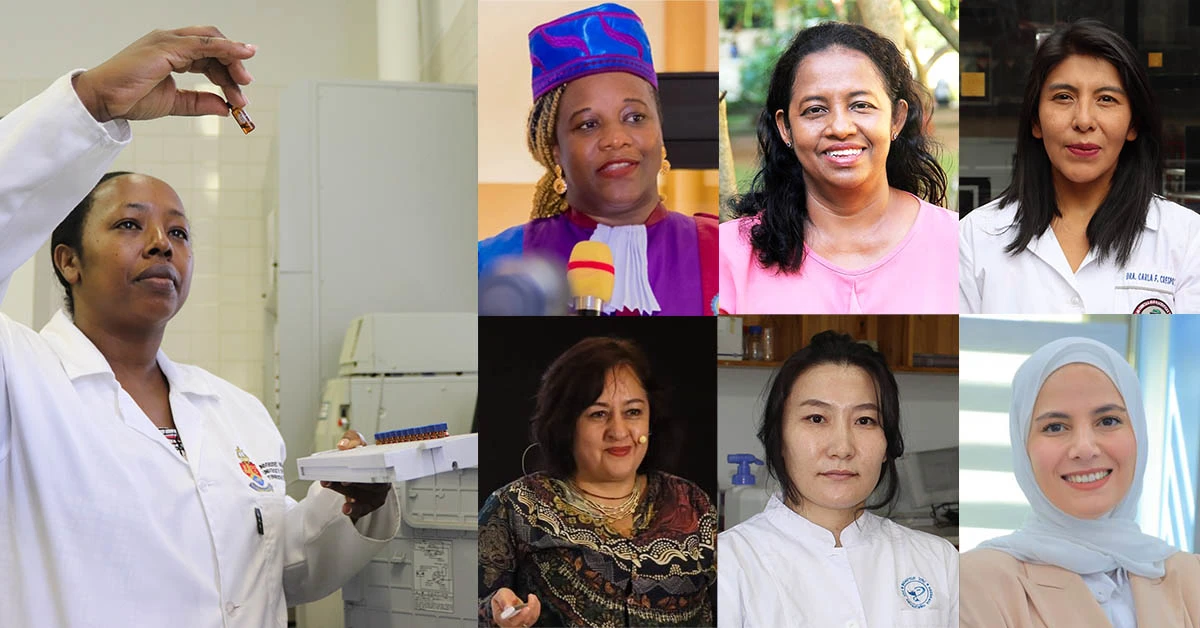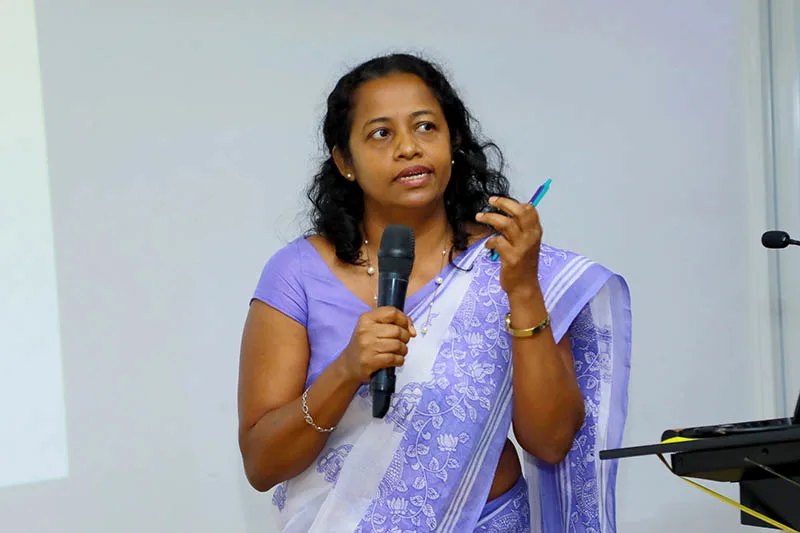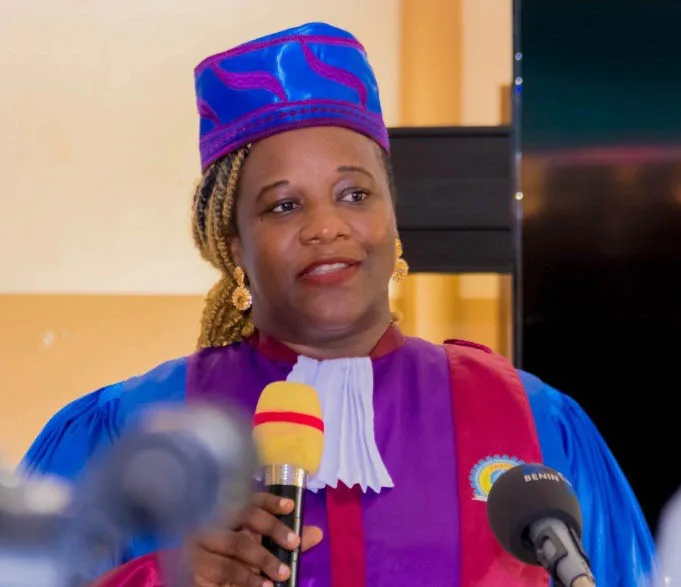7 women scientists from Global South recognized for food security research
February 20, 2023
By Rebecca Clear

The 2023 OWSD-Elsevier Foundation Award for Women Scientists taps researchers from Benin, Bolivia, Guatemala, Palestine, Mongolia, South Africa and Sri Lanka.
Pictured above: Winners of the 2023 OWSD-Elsevier Foundation Award for Early-Career Women Scientists in the Developing World (clockwise from left): Eugenie Kayitesi, PhD (Rwanda/South Africa); Yeyinou Laura Estelle Loko, PhD (Benin); Renuka Attanayake, PhD (Sri Lanka); Carla Fabiana Crespo Melgar, PhD (Bolivia); Haneen Dwaib, PhD (Palestine); Munkhjargal Tserendorj, PhD (Mongolia); and Gabriela Montenegro-Bethancourt (Guatemala).
From climate change and COVID to the war in Ukraine, forces are converging to worsen the global hunger crisis. Research is critical if we are to combat food insecurity.
Seven women from the Global South are making an impact with innovative research that is helping meet this challenge while advancing UN Sustainable Development Goal 2: Zero Hunger, which focuses on agricultural productivity and sustainable food production. They are the recipients of the 2023 OWSD-Elsevier Foundation Award for Early Career Women Scientists in the Developing World.
The winners’ research explores a wide range of ways to combat food insecurity, from crop disease resilience to improved child nutrition, and indigenous plant use to increase productivity. The prize also acknowledges the scientists’ commitment to leadership, mentoring and engagement within their communities, including the use of innovative technologies in their research.
Wouldn’t it be amazing if we could achieve SDG 2, Zero Hunger? Our amazing awardees for 2023 are trying to do their bit to bring this about — and what a bit that is! Just read about the research they are doing in their regions of the developing world, and I am sure you will be as impressed as I was when we selected them as the winners.
Jennifer Thomson, PhD
President at Organization for Women in Science for the Developing World (OWSD)
This year’s winners are:
Prof Renuka Attanayake of the University of Kelaniya, Sri Lanka: plant and molecular biology; crop disease identification and management
Dr Carla Fabiana Crespo Melgar of the Universidad Mayor de San Andres, Bolivia: biotechnology and microbiology; increasing agricultural productivity
Dr Haneen Dwaib of the Palestine Ahliya University: nutrition and dietetics; obesity and dietary interventions
Prof Eugénie Kayitesi of the University of Pretoria, South Africa: food science and technology; improved use of indigenous plant-based foods
Dr Gabriela Montenegro-Bethancourt of the Maya Health Alliance, Guatemala: life sciences and nutrition; maternal mortality and child malnutrition
Dr Munkhjargal Tserendorj of the Mongolian University of Life Sciences, Mongolia: Veterinary Medicine, Animal and Food Hygiene; diagnosis and treatment of animal diseases
Dr Yeyinou Laura Estelle Loko of the Université Nationale des Sciences, Technologies, Ingénierie et Mathématiques, Benin: entomology, plant genetic resources and crop protection; insect pests and resistant crops
With these awards, our vision is to celebrate these impressive women scientists who are helping to make real progress towards the UN SDGs. We know that a quarter of all women are engaged in agriculture, which makes them more vulnerable to both climate change and resource scarcity. By focusing on food security in 2023, we want to spotlight the important research undertaken by women who are inspiring role models for communities most affected by this issue.
Ylann Schemm
Executive Director at Elsevier Foundation
First awarded in 2013, the award is given in partnership by the OWSD and the Elsevier Foundation. OWSD chairs a panel of distinguished scientists to select the winners, and the Foundation awards a cash prize for each winner of $5,000 as well as an all-expenses-paid trip to attend a prominent scientific gathering to provide them with vital networking opportunities. This year, the winners will also have the opportunity to publish their work in STAR Protocols, an open access, peer-reviewed journal from Cell Press that offers structured, transparent, accessible, and repeatable step-by-step experimental and computational protocols from all areas of the life, health, earth and physical sciences.
Past award winners have been invited to meet their country’s presidents and have been celebrated by local, national and international media; some have gone on to receive other prestigious awards and fellowships.
The winners
Prof Renuka Attanayake — University of Kelaniya, Sri Lanka

Prof Renuka Attanayake, PhD, of the University of Kelaniya, Sri Lanka, speaks about her research.
Prof Renuka Attanayake is a plant pathologist working on crop disease identification and management in Sri Lanka. Her projects include the optimization of a rapid detection method of coconut phytoplasma in Sri Lanka, and the identification of genetic diversity of white mold pathogen on cabbage and black mold on onions. With her work, she is contributing to the development of resistant inducer treatments and farmers' education to reduce the negative effects of some of the most common crop diseases in her country.
Dr Carla Fabiana Crespo Melgar — Universidad Mayor de San Andres, Bolivia

Dr Carla Fabiana Crespo Melgar is a biochemistry researcher at the Universidad Mayor de San Andres, Bolivia.
Dr Carla Fabiana Crespo Melgar is a biochemist focused on increasing agricultural productivity as a crucial step to alleviate hunger. With her research, she is investigating the potential of using beneficial microorganisms and application protocols as biocontrollers, biofertilizers, bioinoculants and growth promoters for crop production in Bolivia and the region, with the aim of exploring ways they can be produced locally by communities or small companies once the technology and application protocols are validated.
Dr Haneen Dwaib — Palestine Ahliya University, Palestine

Dr Haneen Dwilbin in her lab at Palestine Ahliya University, where she is Chairwoman of the Clinical Nutrition Department.
Dr Haneen Dwaib is Chairwoman of the Clinical Nutrition department, Palestine Ahliya University. She has background in nutrition and public health and a PhD in Biomedical Sciences. She is investigating dietary interventions to tackle obesity as a case of disguised hunger because the lack of a decent, well-balanced diet causes deficits in the majority of micronutrients and occasionally macronutrients. Her research focuses on studying the gut microbiota and finding non-invasive early detection biomarkers of premature cardiovascular dysfunction and adipose tissue inflammation in pre-diabetic laboraratory rats.
Prof Eugénie Kayitesi — University of Pretoria, South Africa

Prof Eugénie Kayitesi in her lab at the Consumer and Food Sciences Department of the University of Pretoria, South Africa.
Prof Eugenie Kayitesi of Rwanda is a food scientist who is trying to improve nutrition, diet diversity and food security in Africa by developing unique products from underutilized food sources, as well as improving their nutritional composition and health promoting constituents. The core of her research relates to indigenous, underutilized African plant-based foods, such as legumes, cereals, green leafy vegetables and fruits. Her work has highlighted the importance of using readily available and affordable food crops to create food products with improved nutritional, functional and sensory quality.
Dr Gabriela Montenegro-Bethancourt — Maya Health Alliance, Guatemala

Dr Gabriela Montenegro-Bethancourt of the Maya Health Alliance in Guatemala speaks about her research in nutrition and food science.
Dr Gabriela Montenegro-Bethancourt is a nutritionist and food scientist whose work contributes to strengthening primary healthcare in rural Guatemala. She works in the most impoverished communities in Guatemala to provide healthcare in Mayan languages and contribute to reducing maternal mortality and child malnutrition, overcoming barriers to the treatment of complex medical conditions, providing optimal care to children and adults with chronic conditions, and promoting access to clean water. Her research is designed to take into consideration nutrition’s broad strategic possibilities, such as empowering women, increasing the availability of nutrient-rich foods, improving access to health services, and designing effective policies.
Dr Munkhjargal Tserendorj — Mongolian University of Life Sciences, Mongolia

Dr Munkhjargal Tserendorj in her lab at the Mongolian University of Life Sciences.
Dr Munkhjargal Tserendorj is a Veterinary Doctor with a PhD in Animal and Food Hygiene, who is helping Mongolia to control economically important tick-borne diseases. She has conducted national and international projects for strengthening capacities in the diagnosis and treatment of animal diseases, especially vector-borne diseases, leading to the development of effective strategies to decrease severe economic losses in the small ruminants' population in Mongolia. Data from these studies is now used as base information for initiating prevention and control programs.
Dr Yeyinou Laura Estelle Loko — Université Nationale des Sciences, Technologies, Ingénierie et Mathématiques, Benin

Dr Yeyinou Laura Estelle Loko of the Université Nationale des Sciences, Technologies, Ingénierie et Mathématiques, Benin.
Dr Yeyinou Laura Estelle Loko is an entomologist with a PhD in plant genetic resources and crop protection committed to the reduction of losses caused by insect pests. She develops control methods that respect human health and the environment, favoring the use of naturally resistant varieties, medicinal plants with insecticidal properties, entomopathogenic microorganisms, and predators. She is also working on the development of a digital toolbox and an intelligent monitoring system adapted to smallholder farmers for effective pest management in Benin.
About the award

The 2020 OWSD-Elsevier Foundation Award winners at the AAAS Meeting in Seattle (Photo by Alison Bert)
Since 2012, the OWSD-Elsevier Foundation Awards for Early-Career Women Scientists in the Developing World have recognized the achievements of researchers who have made significant contributions to the advancement of scientific knowledge. The program represents a longstanding partnership between the Organization for Women in Science for the Developing World (OWSD) and the Elsevier Foundation.
Each year, winners are selected from the following regions: Africa, the Arab region, Asia and the Pacific region, and Latin America and the Caribbean. Prizes are awarded annually on a rotating basis among SDG topics and research areas. With the latest winners, the program has awarded 58 scientists from 33 countries.
OWSD chairs a panel of distinguished scientists to select the winners, and the Foundation awards a cash prize for each winner of $5,000 as well as an all-expenses-paid trip to attend a prominent scientific gathering to provide them with vital networking opportunities. This year, the winners will also have the opportunity to publish their work in STAR Protocols, an open access, peer-reviewed journal from Cell Press that offers structured, transparent, accessible, and repeatable step-by-step experimental and computational protocols from all areas of the life, health, earth and physical sciences.
Past award winners have been invited to meet their country’s presidents and have been celebrated by local, national and international media; some have gone on to receive other prestigious awards and fellowships.
Information for this page was provided by OWSD and the Elsevier Foundation.
Contributor

Rebecca Clear
Corporate Responsibility Communications Director
Elsevier
+44 7919 396403
Read more about Rebecca Clear